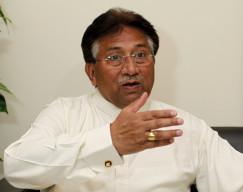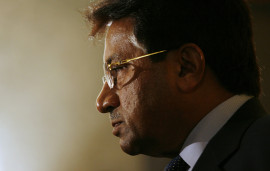
As a federation we have performed poorly; as a democracy we have collapsed on every signal and as a polity we have done little to protect the constitution which has been suspended, held in abeyance, abrogated and mocked at time and time again. The only good news is that there is something in our political culture that repeatedly helps us recover from monstrous distortions and brings us back to the closest we can get to the federal, democratic and constitutional purity that we originally envisaged. That is the good news and the bad news is that democratic and undemocratic narratives are failing to take into cognizance the radical change that has materialised in the atmospherics. Mentally we are either stuck in 1999 or in 2007, the beginning and the fag-end of the last military led political dispensation.
In the past 15 years following Musharraf’s coup the country has transformed. The army, as an institution, has transformed. This is an educated army in which even an ordinary soldier has to complete ten years of mandatory education before joining. Today’s army has seen 13 years of non-stop action. Despite some misunderstandings caused by a few conspiracy theorists, its threat perception and world view have drastically changed. It is more receptive to a nuanced debate on national interest and is fully capable of absorbing healthy criticism and viewpoint of the civilians when it chooses to set aside its emotional baggage.
The very character of state has also changed with the diffusion of power. The 1999 coup began with the army taking over the PTV compound in Islamabad. There are now so many channels that it becomes a herculean task. Apart from media which by the way now includes the internet, mobile text messaging and the social media, other power brokers like the judiciary and the civil society have also reasserted their force. In the past six years right from the misunderstanding over the Kerry-Lugar-Berman Bill and the memogate to the ongoing ordeal system has shown incredible capacity to absorb major shocks. It seems almost a forgone conclusion that with all these changes the prospects of an all-out military takeover are next to nil. What we now need to deal with is the mistrust between institutions, the doubts lurking in our subconscious minds and issues that divide us.
In my humble opinion the biggest issue that is dividing us is the matter of high treason. The framers of the 1973 constitution must have seen it fit to introduce Article 6 but since then it has only existed as a redundant but tempting weapon whose sole use has been to offend and divide people. Punishment at any level is employed to set an example and deter people from committing same crime again. We have done a poor job at setting an example for except for Musharraf’s case it has never been used. And since its application at this stage instead of working as deterrence threatens to sabotage whatever strained institutional harmony that has existed. If we convince ourselves that there is no chance of martial law again we can do away with this relic of the past.
How else then can we address the serious issues that necessitated the introduction of this clause? Answer has three parts. First there is need for a permanent and all powerful truth and reconciliation commission. Even charter of democracy envisaged something similar albeit of a limited scope. This way we learn lessons from the past. Second, we need to expand and apply the principle of charter of democracy to other parties so that a political consensus emerges. Lastly, there is too much weight in Senator Farhatullah Babar’s suggestion of a civil military dialogue. Perhaps a mechanism can devised for a dialogue between the parliament and the army as an institution. I know the idealists among us must be getting restless by now. But how long can we live in denial about our history? We need to move on and treat our soldiers as citizens in uniform. If a clear understanding of each other’s concerns is achieved we can develop a consensus on the serious national issues. If I am not mistaken, the incumbent prime minister had advocated something similar in the name of a Charter of Pakistan.
Published in The Express Tribune, September 20th, 2014.
Like Opinion & Editorial on Facebook, follow @ETOpEd on Twitter to receive all updates on all our daily pieces.
COMMENTS (1)
Comments are moderated and generally will be posted if they are on-topic and not abusive.
For more information, please see our Comments FAQ










































Same old cliched thoughts and words. Columns are becoming a major time waste on ET